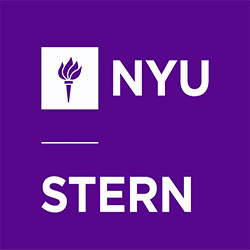 Bárbara Argeri is a current Tech MBA student, specializing in Tech Product Management. Prior to Stern, Bárbara worked as a Product Strategy Manager at Mercado Libre in Brazil. Post-MBA, she plans to work as a Tech Product Manager. At Stern, she is involved in several student associations such as Stern Technology Association, Stern Women in Business, and Latin American Business Association. During her free time, she enjoys strolling around New York searching for new places, and spending time with her friends.
Bárbara Argeri is a current Tech MBA student, specializing in Tech Product Management. Prior to Stern, Bárbara worked as a Product Strategy Manager at Mercado Libre in Brazil. Post-MBA, she plans to work as a Tech Product Manager. At Stern, she is involved in several student associations such as Stern Technology Association, Stern Women in Business, and Latin American Business Association. During her free time, she enjoys strolling around New York searching for new places, and spending time with her friends.
When I was learning more about different MBA programs, the content I liked the most was about the day in the life of an MBA student, since they provided me with a real sense of what life would be like. Because of this, I didn’t think twice when I was given the opportunity to write this blog!
7:30am: I wake up early for my classes. Since I live on the Upper East Side, I take a while longer to get to campus. I prepare some coffee, get something to eat, and head to the Q subway station on 72nd street. It is a 20-minute ride and I try to keep up with some of my favorite podcasts along the way.
8:45am: I arrive at Union Square. Although I could transfer to the R or W to arrive near Stern, I prefer to leave at Union Square and walk for 10 minutes to campus since the weather is nice. I pass by Washington Square Park and have one of those funny moments when I realize “Oh my God! I live in New York now.” I arrive just in time for my “Blockchain and Cryptocurrencies” class.
11:50am: Cryptocurrencies class was great. We talked about the regulations of crypto markets and possible impacts for the future. We had a speaker from one of the world’s biggest cryptocurrencies exchange platforms. It’s incredible to hear the perspective of someone who’s so actively inserted in the business.
12:00pm: Recruiting time! We have a corporate presentation of one of the companies I am most interested in working with. Time to better understand their culture, ask questions, and network with their employees. It’s so helpful to get to meet the recruiters in person and build relationships with them. And that’s much easier when they’re a few subway stops away. This allows me to meet so many different companies – and also visit their offices some times.
01:00pm: Time to grab a snack before meeting with one of my project groups. For this project, we are working as consultants for a color- analytics startup, which is very disrupting. We are helping them develop the wireframes of an app they are planning to launch. The pages are almost ready to be submitted to user testing. We’re excited to be working closely with the client on something that they are actually launching soon! This course is also a great opportunity to strengthen my Product Management skills since that’s the career I want to pursue after graduation.
03:00pm: Time to work on some homework and readings. As we approach the end of the semester, we have quite a few papers due. I like to go to the “Grad Lounge” for that, since my classmates usually hang out there, and you also get to meet different people. This time, one of the students associations left candy to support students during finals week. That has definitely given us a mood boost!
05:00pm: Done with the duties. Time to grab a coffee and something to eat and meet up with some friends that are around campus to chat and relax for a bit. We are discussing what the plans for this weekend we’ll be. A pot luck dinner maybe!?
06:00pm: Last stretch of the day – “Data Science for Business” class. Today, we learned about language models that are developed to identify and filter possible spam emails. It’s so interesting to learn about the methodology and discuss possible variables and impacts. This class is great to help you understand data mining concepts and prepare you to speak with data scientists.
09:00pm: Class is over! Time to meet with my husband and grab something to eat around campus before heading home. What a long day. Nothing better than watching an episode of my favorite series and going to bed.











